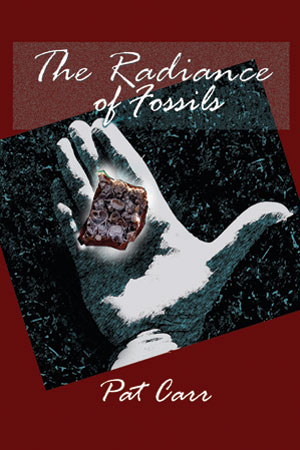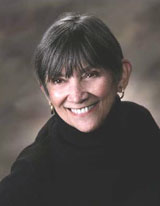Pat Carr knows what discerning reads want: a textured, page-turning story. In The Radiance of Fossils, she offers this and more–a steely eye, delicious honesty, and resonant, surprising language. Set in a small writers’ retreat, a microcosm of human folly and sometime grace, Carr sets her protagonist on a quest for love lost and an answer to the dilemma of aging. You’ll want to be there for the unexpected findings.
–Jo McDougall, author of Daddy’s Money and Dirt
The Radiance of Fossils shows off Pat Carr’s marvelous gifts as an author of short fiction: her clean, sharp narrative, her ability to create a character in a single phrase, and the deceptive simplicity of her stories. This lighthearted romp through that Neverland of the writers’ world, the weekend workshop, is also great fun.
–Bryan Woolley, author of Sam Bass and Some Sweet Day
The Radiance of Fossils is the wickedly fascinating story of a small group of people at a weekend literary workshop. They have persuaded themselves that they are there to improve their writing skills; they are really in search of self-knowledge, of love, of Large Answers. Their stories are filled with ironic humor which somehow reminds me of Jane Austen. This is a witty, funny/sad/kindly look at the human condition. In short, I was amused, intrigued, bewitched and couldn’t put it down.
–Shirley Ann Grau,
author of The Black Prince and
the Pulitzer Prize winning Keepers of the House
2
Only a few travelers have taken this late flight, but since they unbuckle and rescue their carry-ons with singular leisure, it takes longer than I expect to move down the plane aisle, into the metal sleeve of the hallway, and on to the lobby.
Even fewer people are meeting Flight 596 from New Orleans by way of Dallas, and I immediately recognize the woman who’s come to ferry me to her mountain.
Tall and gaunt, with a single, taffy braid down her back, she wears a khaki work shirt, khaki bush shorts and army-issue socks tucked into all-weather shoes of bilious yellow. She stands watching the door with a stare that can charitably be described as disengaged.
I stop beside her. “Swallow?”
I feel a fool, but I know with certainty that she’s someone who would run the kind of mountain retreat I’m retreating to, that she’s a left-over back-to-the-land type who would choose her own ornithological name.
Her eyes, pastel egg blue, click toward me. “You’re Dalton Randall, aren’t you?” She reaches out a no-nonsense hand, with the bone structure of a hardy farmer, for my suitcase.
I relinquish the bag without protest.
“Is this all you’ve got?” she says.
“I’ve been on enough archeological digs to know about traveling light.”
But she’s already striding ahead, clearly knowing I’ve brought only one suitcase, and as we weave past baggage claim without pausing and emerge into the lavender evening heat, she dislodges a heavy gold chain and pendant-a four-inch-long crystal with the blunt angles of a perfume vial-from beneath her khaki collar. The huge, sallow obelisk, on a herringbone gold chain, thuds against her sternum.
The electric door wheezes shut behind us, and I want to grab her capable sleeve and tell her that I need to return to New Orleans before my husband Trent leaves for Rio. I feel a desperate urge to tell her that this whole trip has been a wretched mistake.
Her yellow shoes pace too far ahead for me to reach her, however, and as we cross the pedestrian yellow lines into the parking lot, I lose the moment to tag her elbow and inform her that I can’t possibly go with her.
I follow her to a black Jeep, and as she stows my leather case with the solicitude of a Grand Central red-cap. I wonder how she perfected such a servile mannerism since I know from the gold chain and the too-large crystal that she comes from money.
And not Trent’s kind of high-salaried money. She comes from wealth that doesn’t even realize the point of wearing a shaft of silicone dioxide is to mock the opulence of conventional diamonds.
We climb into opposite sides of the Jeep, and she turns the key. The motor, the air-conditioner, and the car radio purr on in mid-sentence as a news reporter announces in a mid-western accent-an accent identical to every other news reporter in the nation-that Governor Clinton of Arkansas has decided to run for president after all.
With no political commentary, she punches off the sound, and within seconds of being ticketed from the lot, she swings onto a freeway and roars into the velvety night.
I shallow my breath, stave off the panic of being out of control, and say, “How far is your retreat?”
“Three hours. It’s only a hundred miles, but the last twenty take a good hour.” She glances at me. “This is the first retreat we’ve scheduled for writers. Don makes all the arrangements and since this is something new, I just hope it goes well. Don’s dad had by-pass surgery yesterday in Atlanta. There were no complications, but with a controlling mother like Mrs. Seward, she insisted Don come home to Georgia.”
I haven’t heard of a Don Seward, and I’m surprised he hasn’t taken a name like ‘Leaf’ or ‘Peace.’
“So Don won’t be here for the Fourth of July,” she adds in a faintly whiney voice. “I’ll drive down to meet the plane from Atlanta when I take you back to yours, but I’m not used to doing this alone, and I’m worried about how a bunch of writers will fit together. Especially with Archer Giles. Have you ever seen him on a talk show? He’s a piece of work.”
She snaps on the headlights, illuminating the dashboard dials in undersea green, and asks, “So why did you come to this workshop?”
The air-conditioner is pumping iced air onto my neck, and when my hand shakes as I deflect the vents, I tell myself my fingers are merely quivering with the cold. “I saw a poster in the Liberal Arts Building advertising a writing retreat with Archer Giles, and I thought I’d like to see for myself how a bunch of writers fit together with him for a weekend.”
She slides green incredulity toward me. “You’re an archeologist! Don even has your monograph on Hopewell pottery. Why would you want to attend a fiction workshop in Arkansas?”
Trent had asked the same question. “Come with me to Rio,” he said. “Why in hell would you want to go to the Ozarks?”
Trent’s outrage, perfected for use on the residents he supervises, is galling, but I resisted snapping, “Why the hell not the Ozarks?” and substituted, “I’ve been to Rio with you. Remember?”
“You were in Brazil twenty years ago,” he said. “I think both you and Rio de Janeiro may have changed.”
His emphasis on the passage of time and change is also wearying.
I don’t say any of that to Swallow and I answer her query with, “I read a couple of Archer Giles’ books. I decided he’d be interesting to study with.”
“Giles is a piece of work all right,” she repeats. “Don wanted people who wouldn’t bite each other’s heads off, but when we called Archer Giles to see if he wanted to review the applicants, he said it didn’t matter, that they’d all be–” She breaks off into a discomfited silence.
“–that they’d all be bad.” I laugh to soothe what’s likely uncharacteristic concern. The laugh is my forced, telephone version, but she won’t know that. “From what I’ve read, that sounds exactly like something Archer Giles would say.”
The sudden anxiety that she’s blundered spurs her into a volley of descriptions of the other workshop attendees already secure on her mountain, but since I haven’t heard of any of them, I don’t try to sort them out.
Nor, as we turn off the freeway onto a two-lane highway winding into the mountains, do I attend her review of how the businesslike Don has managed the sleeping arrangements. I knew from the brochure that I could pay extra and reserve a cabin for myself, so I let my mind wander.
To a rumpled bed, a head of black curls, and calloused fingers stroking my bare skin.
I bring myself back to the green dashlight, Swallow’s voice, and the night countryside. She’s explaining that all of her meals are vegetarian.
An inverted overhead basket of oak branches glares down briefly from the night, then vanishes into the blackness as Swallow maneuvers the right-angle curves of the narrow road.
A yellow warning sign, NEXT THREE MILES WINDING AND STEEP, jumps into the headlights and informs me that I’ve been clutching the hand-rail above the Jeep door under the mistaken impression that as soon as we left the interstate, the road became winding and steep.
I continue to clamp the bracket firmly.
The dashboard clock reads 11:21 as the sleepy lights of minuscule towns funnel by, and the highway at last straightens into a valley.
After a few more miles, the Jeep swerves off the yellow-lined blacktop, crosses a one-lane bridge that leads to a discernibly more cramped highway.
Within minutes we’re on a gravel road.
“The last three miles are a little rough.” She yanks the steering wheel to avoid a boulder the size of a skull, and the Jeep labors along what could be a dry riverbed rather than a road. We bounce over the pipes of a cattle guard, and a dirt lane replaces the gravel road in the headlights.
“I came down this far to meet Hovencamp and Montell and lead them up. There’s a mailbox if you’re expecting a letter.” She indicates with her head while she keeps her eyes on the rocks and the dirt road.
If Trent has sent a letter, I don’t intend to take it from the mailbox. And if someone else gathers in the mail and hands it to me, I won’t open a letter from Trent before I toss it.
The sky becomes a vast crust of stars, and Swallow drives through an open gate into a compound. It’s vaguely what I imagined the retreat would be from the hazed photo on the brochure. A large house sits surrounded by cabins, a stand of trees, and in the shadows, log cubes with roofs of faintly gleaming tin rise somber and deserted.
But a lamp shines from the window of the main house, and a rectangle of yellow light splays onto the ground.
Just as Swallow spins in beside two parked cars, the silhouette of a man holding a tumbler passes the window. The man comes out the front door, stands briefly, then reaches back for the light switch. Light floods the porch with a savage white beam.
I climb down from the Jeep, conscious of the rasp of pebbles under my sandals. The light glares into the night with the harshness of flint, and I step into it.
“My God! Dalton!” Archer Giles says from the porch. “What are you doing here?”
If you would like to read more of The Radiance of Fossils by Pat Carr, order your copy today.


 Pat Carr
Pat Carr
Reviews
There are no reviews yet.